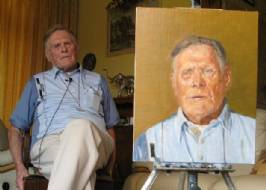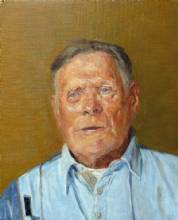The International Raoul Wallenberg Foundation has commissioned painter Felix de la Concha to create a portrait as well as conduct an interview with Denis Avey, a man who “smuggled” himself into Auschwitz from an adjacent camp where the Nazis kept British POW. Governed by a desire to see for himself what was going on inside the death camp, Avey bore witness to horrible suffering. The interview is a part of a bigger project aimed at portraying and recording Holocaust survivors that Mr. De la Concha has been carrying on since 2008.
During WWII, Denis Avey was captured and sent to a compound for British war prisoners connected to the Auschwitz concentration camp. Although conditions in this compound were somewhat bearable, British prisoners worked alongside Jewish prisoners during the day. No talking among the two groups was allowed and death penalty awaited those who dared break this rule.
However, Avey managed to get in touch with a Dutch Jew of a similar stature and arrange for an ”identity” switch. After exchanging clothes, Avey shaved his head with a razor, dirtied his face and eyes, and went inside. After all these years, Avey is still in disbelief over what he has done, ”I was a nut case. It is ludicrous to affect the situation like that.”
Avey spent two nights inside the camp. Later he found out that he was in Auschwitz III, also called Buna or Monowitz. ”It was a hell on earth. The most evil place possible,” he confessed to Mr. De La Concha during the interview at his Derbyshire home this June.
During the Nazi evacuation of Auschwitz, Avey was sent to a death march. ”We walked over dead bodies for days at a time,” he remembers. Luckily, Avey escaped upon reaching Austria and managed to get to England, helped by a group of U.S. soldiers he met close to Nuremberg.
It will still take him almost 60 years to tell his story.
”I was totally saturated with the bestiality that was going on every day in Auschwitz. It gets right into you. I think as I said, even nature turned its back on Auschwitz. I didn’t see a bird, a bee, or a butterfly the whole time I was there. Nature had completely disappeared.”
Years after the war, Avey still had nightmares and could not answer when asked questions about the war. He spoke to no one about it. Not even his parents knew. Upon reaching the UK he tried to report about what he had seen to two superiors in the army, but they didn’t believe him. Auschwitz was not yet known in post-war Britain.
When Avey obtained a 100% war pension several years ago, he was invited to talk about his experience on BBC radio. During that interview, he suddenly started talking about Auschwitz. And they let him. Radio producers canceled the two following programs to listen to his story.
Consequently, BBC produced a documentary about him and found the name of the Jewish prisoner that Avey helped while imprisoned. Although facing the death penalty, Avey had communicated with a man who told him his sister was on a child transport and was living in Birmingham, England. Avey asked for his sister’s address determined to find a way to contact her and let her know that her brother was well. It was Avey’s mother who did just that after receiving a letter from him. Four months after the letter was sent, Avey received a package with two hundred cigarettes and a chocolate. It was from the Jewish prisoner’s sister. She had sent that package hoping that it would somehow reach her brother. And it did. Avey gave the cigarettes and chocolate to a man whose name he never knew.
As it turned out to be, that made all the difference for Ernst Lobethal. In an interview he gave for Shoa Foundation, Lobenthal talked about a redhead British POW who saved his life. It was thanks to the cigarettes and chocolate that he was able to bribe guards and to even acquire a good pair of shoes that really helped him during the death march in freezing cold winter. Lobenthal managed to escape the death march and eventually moved to the U.S. He died at 87 years old never finding out the name of the man who helped him.
Almost 92 years old now and looking back on what he did, Avey gives a simple explanation, ”I wanted to know everything. It gets you into lot of trouble but you sleep at night.”
For more information on Felix de la Concha click here.


